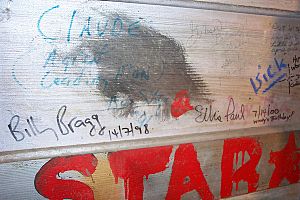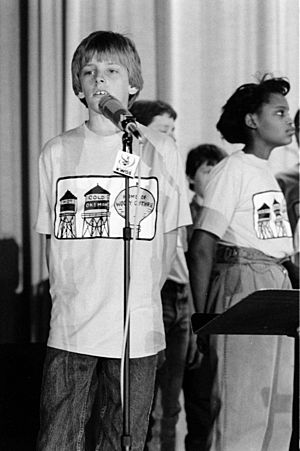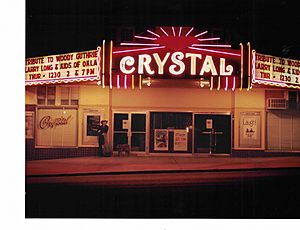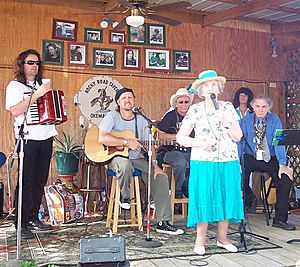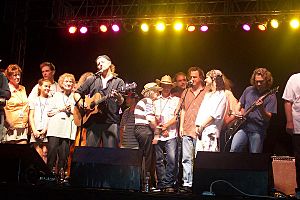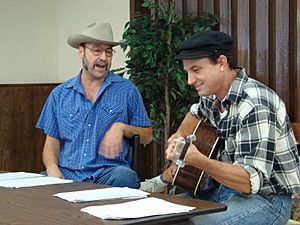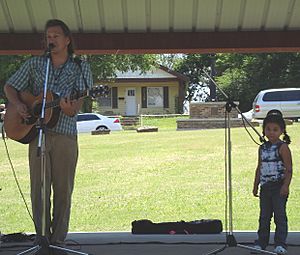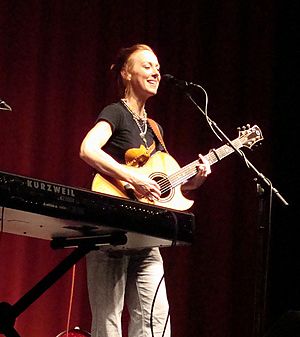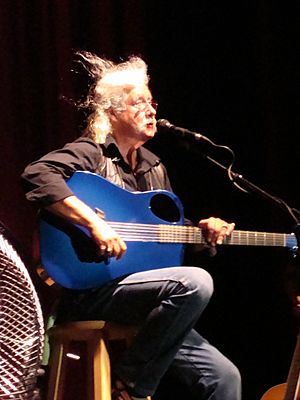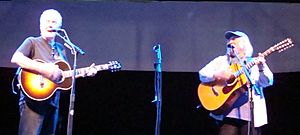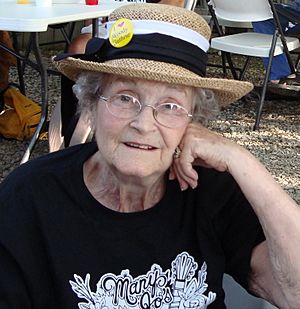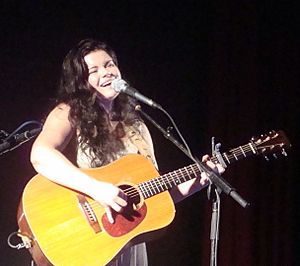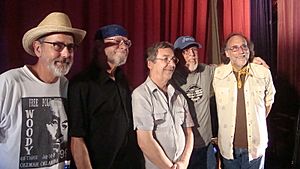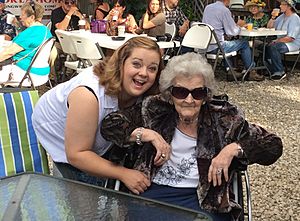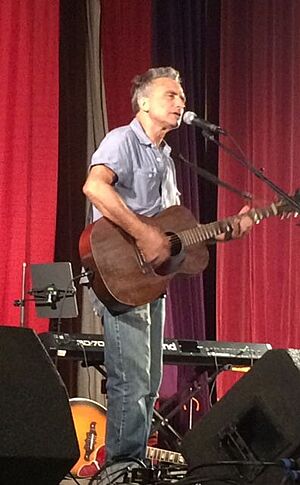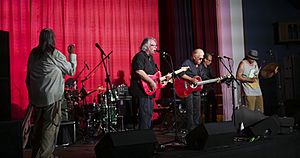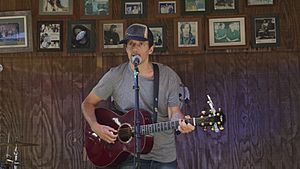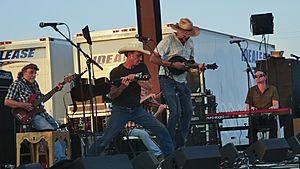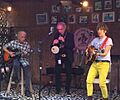Woody Guthrie Folk Festival facts for kids
Quick facts for kids Woody Guthrie Folk Festival |
|
|---|---|
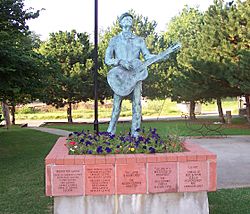
|
|
| Genre | Folk, country, blues, folk rock, red dirt |
| Dates | mid-July |
| Location(s) | Okemah, Oklahoma |
| Years active | 1998–present |
| Founded by | The Orphanage Society and the Woody Guthrie Coalition |
| Website | Woody Guthrie Folk Festival |
The Woody Guthrie Folk Festival is a yearly music event. It happens in mid-July to celebrate the life and songs of Woody Guthrie. The festival takes place in Guthrie's hometown of Okemah, Oklahoma. This is usually on the weekend closest to July 14, which is Woody's birthday.
During the day, performances are held indoors at places like the Brick Street Cafe and the Crystal Theatre. In the evenings, bigger shows happen outdoors at the Pastures of Plenty. A group called the Woody Guthrie Coalition organizes the festival. They are a non-profit group, meaning they don't make money for themselves. Their main goal is to keep Woody Guthrie's music and ideas alive. The Oklahoma Arts Council also helps make the event possible with a special grant. Woody Guthrie's younger sister, Mary Jo Guthrie Edgmon, is always a special guest at the festival.
Over the years, people started calling the festival "WoodyFest." It began in 1998. Famous musicians like Woody's son Arlo Guthrie, Billy Bragg, Ellis Paul, and Jimmy LaFave played at the first festival. To mark the start of the festival, the Woody Guthrie Coalition asked a local artist to create a bronze statue of Woody Guthrie. The statue shows Woody with his guitar, which has a famous message: "This machine kills fascists." The artist, Dan Brook, made the statue. It stands on Broadway, the main street in downtown Okemah.
The Woody Guthrie Coalition wanted the Guthrie family's permission to start the festival. Arlo Guthrie and his sister, Nora, felt strongly that their father would want the festival to be open to everyone. They said they would approve the festival if it was free to attend. The organizers agreed. For 17 years, the festival was free, except for a small parking fee. But after facing money problems for several years, in 2015, the organizers started charging a fee for two of the music spots. However, two other places still offered free music. To keep costs low, artists play for free, but the Woody Guthrie Coalition pays for their travel and lodging. Many musicians love to play at WoodyFest because they believe in its purpose.
Contents
How the Festival Started
In the early 1960s, Woody Guthrie lived in New York. Even though famous musicians like Bob Dylan visited Guthrie, who was very sick with an illness called Huntington's Disease, his hometown of Okemah didn't want to remember him. Some people in Okemah were suspicious of Guthrie. They thought he was a Communist because of his writings in a newspaper called The People's World. Also, Guthrie sang his beliefs at worker rallies, sometimes with other outspoken artists like Pete Seeger. Even in 1971, the Okemah City Council refused to declare a "Woody Guthrie Day" because of his political views.
By the 1970s, most young people in Okemah didn't know about Guthrie. But fans of Guthrie started visiting Okemah to see the house where he lived. Woody's son, Arlo, who was a famous folk singer by then, also visited Okemah sometimes to understand the situation.
About ten years before the first festival, a musician from Minnesota named Larry Long decided to follow Woody Guthrie's path. He wanted to be a traveling musician who sang about important issues. With help from the Oklahoma State Department of Education and the Oklahoma Arts Council, Long moved to Okemah. He worked with students at Oakes Elementary School and Okemah Middle School as an artist-in-residence. Over several years, Long slowly gained support from local people. He helped students put on a concert to honor Woody Guthrie.
Some people in Okemah were strongly against any tribute to Guthrie. They didn't think he deserved recognition. Several letters against the idea were published in the Okemah News Leader newspaper. But at the same time, supporters of Long's work also wrote letters. Support came from local people and from others across the country, including Pete Seeger.
Long said that Woody Guthrie changed his life when he was a kid. He felt very connected to Woody's traditions. He believed Woody was a hero and that celebrating him would be good for Okemah.
With the help of middle school principal Larry McKinney and school board president Mark Smyth, the first tribute to Woody Guthrie happened on December 1, 1988. Students from different towns performed songs they had written with Long's help. A seventh-grader named Jerry Baker read parts of Woody's writings. These were also translated into the Seminole and Creek languages by an Elder named Woodrow ‘Wotko’ Haney. Other musicians also performed.
McKinney said the artist-in-residence program was a "good learning experience" for his students. Long explained that the song lyrics came from students interviewing their families and each other. So, the celebration was not just for Woody, but for the whole community. Woody's sister, Mary Jo Guthrie Edgmon, attended the concert. She later said she felt her family's warmth around her and was proud when the children performed.
NBC's Today Show even sent a reporter to cover the event. Local people, both for and against the tribute, appeared on the show. News of the concert spread, with headlines like "Guthrie finally gets a hometown tribute."
The concert was recorded and released as an album. The next spring, the album's release was celebrated with Arlo Guthrie playing his first full concert in his father's hometown. The following year (1990), Okemah declared July 14, Woody's birthday, an official city holiday. On that day, Long returned for a musical gathering called a "hootenanny." News of this spread, and a newspaper headline even read: “This is the way the Cold War ends, as a Hootenanny.”
Because of Long's work, a group called W.O.O.D.Y. (Woody Guthrie Okemah Organization for Developing Youth) was formed. Their goal was to hold a yearly event to honor Woody Guthrie and raise money for local youth education. This group eventually became the Woody Guthrie Coalition Inc.
However, it wasn't until the late 1990s that Okemah truly started to embrace its famous son. This happened when Billy Bragg visited Okemah to film parts of his documentary about the album Mermaid Avenue. This album featured unknown Guthrie lyrics set to Bragg's music. Bragg helped kick off the first festival in 1998. One writer noted that people's attitudes in Okemah changed from anger to acceptance. While the festival helped the town's economy, the kindness of the local people was also very real.
Early Festivals (1998-2002)
The first Woody Guthrie festival in 1998 was partly presented by The Orphanage Society, a group that supports live folk music. The festival featured many artists who would become "WoodyFest" regulars, including Tom Paxton and Ray Wylie Hubbard. The mayor of Okemah welcomed everyone, saying the festival was "just the beginning of the great things to come."
The festival lasted three days, from July 17–19, 1998. Billy Bragg and Ellis Paul started things early with a special show on Woody's birthday, July 14. Paul said that visiting Okemah felt like walking in Woody's footsteps. He even admitted to taking a small piece of rock from Guthrie's old house as a souvenir.
The second festival in 1999 included welcome letters from both the mayor and the governor of Oklahoma. The governor said Woody Guthrie left a "rich legacy" for future musicians. Arlo Guthrie was a main performer, along with The Kingston Trio. Other artists like Country Joe McDonald also made their first appearances. The festival started with a special hootenanny on Woody's birthday.
The third festival in 2000 featured a letter from Nora Guthrie, Woody's daughter. She thanked everyone in Okemah for their hard work. The festival began with a special concert by Jackson Browne. Pete Seeger also performed for the first time. After the main shows, musicians had all-star jam sessions at local spots. The festival ended with a hootenanny to raise money for Huntington's Disease research.
In 2001, the mayor of Okemah welcomed attendees, noting how Woody Guthrie's style influenced the performing artists. The festival started with a fundraiser concert that used the original script from a 1968 Carnegie Hall tribute to Woody. New performers included Lucy Kaplansky and Vance Gilbert. For the first time, a children's festival was held. The event ended with a gospel music service.
The fifth festival in 2002 began with a benefit concert by Steve Young. New artists included Irene Kelley and Johnsmith. Open mic sessions were held, and the children's festival returned. The festival concluded with a tribute to Woody Guthrie, featuring songs and stories about his life.
Later Festivals (2003-2007)
In 2003, the Woody Guthrie Coalition welcomed festival-goers, excited to have Arlo Guthrie and his family back, along with Pete Seeger and Josh White, Jr.. Many Guthrie family members attended. Other new performers included Ramblin' Jack Elliot and Eliza Gilkyson. The festival started with a special show called "Welcome Home Woody." It ended with a "Hoot for Huntington's" to raise money for Huntington's Disease research.
A new fundraiser started in 2003: "Mary Jo's Pancake Breakfast." This event allows Woody Guthrie's youngest sister, Mary Jo, to share stories about her brother while musicians play his songs. This breakfast has become a yearly tradition.
Steve Earle was a main performer at the 2004 festival, making his first appearance. The festival opened on Woody's birthday with a "Happy Birthday, Woody" concert. Other new artists included Kris Delmhorst and David Wilcox. The festival ended with another "Hoot for Huntington's."
David Amram, a musician who first met Woody Guthrie in 1956, finally visited Okemah in 2005. He said he had always wanted to see Woody's hometown to understand him better. Amram and his son, Adam, were main performers. Other new artists included Peter Yarrow and John Fullbright.
The 2006 festival celebrated nine years. The president of the Woody Guthrie Coalition said they were lucky to find great artists who believed in the festival's spirit from the start. New performers included Ronny Cox and Joe Ely. Arlo Guthrie and his family brought their "Alice's Restaurant Massacree" tour to kick off the festival. Other highlights included poetry readings and an art show featuring Woody Guthrie's artwork. The festival ended with the "Hoot for Huntington's."
The 10th annual festival in 2007 was a big celebration. Seven artists who had played every year since the beginning performed at a special show. More than 100 artists performed, including members of the Guthrie family. The festival ended with the "Hoot for Huntington's," which had become a WoodyFest tradition. A special "House Band" played backup for many performers and also had their own set.
Festival Highlights (2008-2019)
In 2008, a regular festival artist, Bob Childers, passed away. A special tribute show was held for him before the festival started. The festival program also included a memorial page for him. The 11th festival officially opened with Country Joe McDonald's tribute to Woody Guthrie.
Highlights included first-time performances by Judy Collins and John Gorka. A special tribute to Phil Ochs was also held. Young singer-songwriters also made their debut. A play about Woody Guthrie and Bob Wills was read for the first time. Musicians also visited local senior centers as part of a community program.
Several musicians performed at the Children's Festival, including Ellis Paul, who sang songs from his award-winning children's CD. Kids could also enjoy surrey rides, harmonica lessons, and face painting. The Children's Festival is supported by a grant from the Viersen Family Foundation. The 2008 festival ended with the traditional "Hoot for Huntington's." Many performers sang Bob Childers' song "Woody's Road" together.
The 2009 festival started with a special show by Wanda Jackson. She said Woody Guthrie influenced music more than anyone else. The official festival kick-off featured SONiA and Jonatha Brooke. Brooke had recently released an album of Woody Guthrie's unrecorded lyrics set to her music. She wrote that WoodyFest draws "the most generous, lovelyest, singingest, kindest, wonderfulest people EVER."
Other highlights included a second annual Bob Childers memorial set. Stoney LaRue made his festival debut. New performers like Mark Erelli also played. Erelli said that Woody Guthrie created the job of a singer-songwriter. The Children's Festival featured performances by the Red Dirt Rangers and Ellis Paul. Experts from the Woody Guthrie Foundation gave talks about Woody's life. New for 2009 were songwriting workshops for both adults and children. Mary Jo Guthrie Edgmon hosted her annual pancake breakfast to benefit Huntington's Disease research. The festival ended with the "Hoot for Huntington's," with musicians singing "Woody's Road."
In 2010, Arlo Guthrie opened the 13th festival on his father's 98th birthday. New musicians like Red Molly and Jess Klein made their debut. Headliners included Stoney LaRue and Ellis Paul. A new guitar workshop was offered. The Children's Festival continued with various performers. The Woody Guthrie Foundation presented talks about Woody's life and legacy. The Crystal Theater, a historic building, was purchased by a community group. They started a campaign to renovate the 100-year-old building so it could be used for the festival again.
The 2011 festival began with an acoustic concert by David Crosby and Graham Nash. Crosby said Woody Guthrie and other folk artists greatly influenced him. Due to ongoing renovations at the Crystal Theater, some daytime shows moved to the Okemah Middle School. New performers included Shawn Mullins and Gretchen Peters. For the first time, a great-grandchild of Woody Guthrie, Krishna Guthrie, performed a solo set. David Amram made his eighth festival appearance, playing with many artists. Jimmy LaFave closed the festival by singing "This Land is Your Land." The "Hoot for Huntington's" featured 23 musicians.
Centennial Celebration (2012)
In 2012, the festival celebrated what would have been Woody Guthrie's 100th birthday. A special plaque was given to Mary Jo Guthrie Edgmon, honoring Okemah and the festival for preserving Woody's music. The 15th festival began with a concert by Arlo Guthrie in the newly renovated Crystal Theater. Billy Bragg returned after 13 years. New artists included Melanie Safka and John McCutcheon. Local musician John Fullbright, who started performing at the festival in high school, played on the main stage.
Mary Jo Guthrie Edgmon, Woody's sister, signed her new book, "Woody's Road." David Amram, who wrote the book's foreword, joined her. At her pancake breakfast, 89-year-old Edgmon thanked everyone for coming to Okemah. Judy Collins closed the festival with a beautiful performance, sharing stories and singing her famous songs. The artwork for the festival was created by Ellis Paul and auctioned off to raise money.
Recent Festivals (2013-2019)
The 2013 festival started with a benefit show by Todd Snider, who said Woody Guthrie "created the job that I do." Other preview performances took place at the Woody Guthrie Center in Tulsa, which opened that year. Jimmy LaFave and friends officially opened the festival with a musical and spoken-word event called Walking Woody's Road.
Over 50 musical performances took place. Many regular artists returned, and new musicians like Trout Fishing in America and Rebecca Loebe made their debut. One new artist said Woody Guthrie wrote about "normal people," which inspired his own songs. A tribute to Bob Childers continued as a tradition. John Fullbright was a main performer, and Jimmy LaFave closed the festival. Other events included poetry, book discussions, and Native American storytelling. Mary Jo Guthrie Edgmon hosted her pancake breakfast, and the festival ended with the "Hoot for Huntington's."
In 2014, a Pete Seeger Sing-A-Long opened the festival. The Crystal Theater hosted daytime performances because the Brick Street Cafe closed. Evening shows were at the Pastures of Plenty. Arlo Guthrie was the Saturday night headliner. A downtown stage was added to make up for the closed cafe. Radio show hosts interviewed artists like Ellis Paul. Mary Jo Guthrie Edgmon, now 91, hosted her pancake breakfast. Presentations included talks about Woody Guthrie's life and his song "Deportee (Plane Wreck at Los Gatos)." The festival ended with the "Hoot for Huntington's."
In 2015, a big change happened: the festival started charging admission for the first time. This was to help the festival stay open financially. Two venues remained free. The number of performers increased to over 90. A tribute to the late Tom Skinner was held. Headliners included Ellis Paul and John Fullbright. New musicians like Tish Hinojosa performed. Hinojosa sang a Spanish version of Woody's "Deportee." Children's concerts were held, and radio show interviews continued. Other events included a one-man show about Woody Guthrie and talks about his legacy. Mary Jo Guthrie Edgmon hosted her pancake breakfast, and the festival ended with the "Hoot for Huntington's."
The 2016 festival opened with a sold-out show by Graham Nash. A major change was the addition of a permanent stage at the Pastures of Plenty. This new stage improved the sound and lights. Heavy rains caused some outdoor shows to move indoors. New artists included Dar Williams and The Honey Dewdrops. Many Oklahoma musicians performed. John Fullbright joined other artists on stage. A songwriting contest winner performed his song "American Dream." The festival continued the traditions of Mary Jo's Pancake Breakfast and the "Hoot for Huntington's."
The 20th festival in 2017 honored Jimmy LaFave, a regular performer who had recently passed away. His band and many other musicians performed a tribute concert. Five stages were used, including a new one at the Hen House Cafe. The festival included poetry, open mics, children's concerts, and workshops. Many Oklahoma musicians attended. Mary Jo Guthrie Edgmon hosted her pancake breakfast, with Joel Rafael as the host. Special presentations included talks about Woody Guthrie's songs and his family's experience with Huntington's Disease. Radio show interviews were taped. The festival ended with the "Hoot for Huntington's." Sarah Lee Guthrie and Arlo Guthrie were main performers, joined by other Guthrie family members.
The 2018 festival featured over 90 musicians. It started with a special event featuring Joel Rafael and John Trudell's Bad Dog Band. Grammy award-winner Jason Mraz made his festival debut as a main performer. Many members of the Guthrie family, including second and third generations, performed. Other artists like John Fullbright and The Turnpike Troubadours also played. A 15-year-old songwriter, Ken Pomeroy, performed her winning song about homelessness. The festival offered many educational programs and events for children. The "Art of the Song" radio show taped interviews. The Woody Guthrie Poets made their 14th visit. Songwriting workshops were held. The festival ended with the "Hoot for Huntington's."
The 22nd festival in 2019 featured Arlo Guthrie, Willie Watson, John Paul White, and many other artists. Members of the Guthrie family continued to perform.
WoodyFest Quotes
"From the very first time I put my foot on the dirt of the festival, I've just felt nothing but welcome in this place. That's probably the best thing about it, is that it's a chance for people to make connections." - Mary Reynolds
"The Woody Guthrie Folk Festival is a perfect tribute to the spirit of Woody Guthrie and his beloved hometown of Okemah, and an important cultural event for all of America, setting an example of how to do things right, and celebrate the arts in a joyous way where the community and the artists all join hands to give our young people standards of excellence to aspire to for whatever they do in life."—David Amram
"This is just a special festival. Woody Guthrie is the heart of the whole folk music thing and folk music has taken on a new role."—Joel Rafael
When invited back for the 2nd annual festival, Ellis Paul accepted the invitation agreeing to perform at the 1999 festival "and every one until the end of time."—Ellis Paul
"...it is not unusual to see impromptu bands form for jams...and we the audience get to see collaborations that we could only normally dream about."—Jela Webb
"...there's definitely something special going on in that scene. It's almost an American music festival secret. It's like beyond description....like, something is happening there that's literally changing the universe....it's rearranging the molecules of the planet...such really soulful musicians."—Jimmy LaFave
"I think the spirit of Woody Guthrie is really alive at that festival, just because I think everybody comes there with a passion for songs and storytelling."—Samantha Crain
Images for kids
 | Bessie Coleman |
 | Spann Watson |
 | Jill E. Brown |
 | Sherman W. White |


